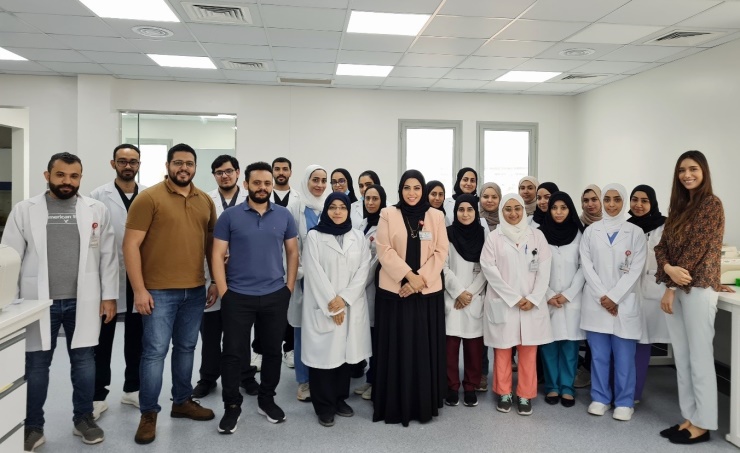A Bahraini medical team tasked to implement the National Human Genome Plan at the Public Health Department has succeeded in recording the first complete sequence of human genome in the Kingdom.
The achievement consisted of three Bahraini human genome samples with a very high coverage rate of 97%.
The team has already succeeded in monitoring the genetic sequence of novel coronavirus (Covid-19) over the past two years, as the number of viral samples subject to integrated genetic sequencing exceeded 27,000.
A team made up of twenty genomics technicians were trained by experts from Illumina, one of the leading companies in the field of Next Generation Technologies (NGS),
The training focused on the the latest genetic decoding protocols that compare them relative to the reference human genome. This innovative technique determines the nucleotide sequences in whole or targeted genomes of DNA and RNA.
The innovative technique can detect thousands of diseases and genetic mutations. The genetic variants and mutations are identified, their pathological phenotypes are linked to genotypes.
These genetic variants are classified according to the standards and rules of the American College of Genetic and Genomic Medicine (ACMG).

The team has also been trained on reporting and sharing them with genetic medicine specialists, using software that harnesses the analytic power of artificial intelligence technology.
The softwares are connected to leading search engines such as the ClinVar Public Archive of the National Center for Biotechnology Information (NCBI), and databases such as OMIM- Online Mendelian Inheritance in Man , which works to link the relationship between genetic variance and phenotypic expression.
The team continues intensive theoretical training in clinical genomic medicine in cooperation with Harvard University, with the aim of qualifying its members to conduct an integrated human genome analysis and knowledge of everything related to it.
This includes the principles of molecular genetics, genetic classification and understanding the diagnosis of common genetic diseases in the Kingdom of Bahrain and searching for ways of treatment and prevention.
The National Genome Center project was launched, in implementation of the directives of His Royal Highness Prince Salman bin Hamad Al Khalifa, the Crown Prince and Prime Minister, through the establishment of a specialized center for genetic analysis.
The centre seeks to rely on genetic information to predict and prevent the most common genetic diseases in the Kingdom of Bahrain, by using next generation genome coding techniques (NGS).
This technology has revolutionized the biological sciences, allowing laboratories to perform many applications and the study of biological systems at a level that was not possible before.
The project aims to collect and analyze 50,000 samples from the Bahraini community, in order to create a comprehensive national database, improve quality and continue to adopt modern health technologies which will help diagnose and develop innovative solutions for citizens.


&uuid=(email))